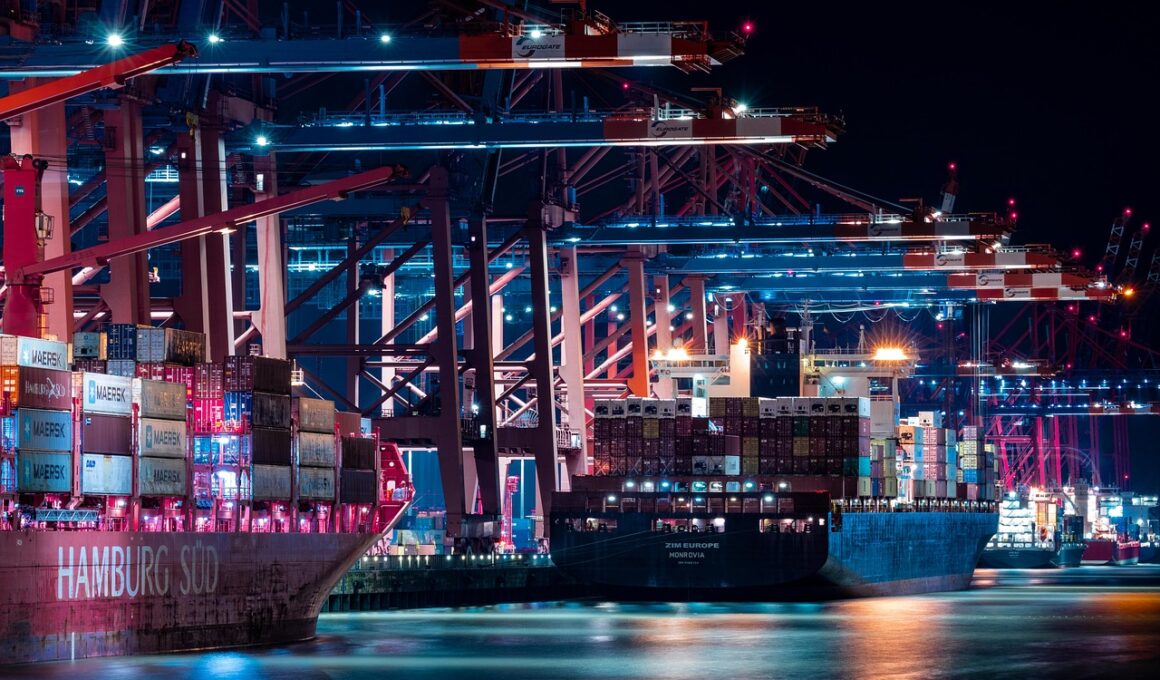Market Distortion and the Use of Subsidies in Export Promotion
In the landscape of international trade, the role of subsidies in export promotion is often contentious due to its potential for market distortion. Trade subsidies can take various forms, including direct payments, tax breaks, and grants to producers and exporters. While governments may justify these financial aids as necessary for economic competitiveness, they can result in significant imbalances. These subsidies can lead to trade distortions as they enable domestic firms to offer lower prices than their foreign competitors, impacting international trade dynamics. Critics argue that such interventions lead to unequal competition, where businesses in countries without similar support struggle to maintain their market presence. The World Trade Organization (WTO) has put regulations in place to mitigate the adverse effects of these trade practices. However, enforcement remains a challenge, and many countries employ creative methods to circumvent these rules. As a result, the global trading environment becomes more complex, with ongoing debates about the ethical implications of such practices. Additionally, the long-term consequences for innovation and market health warrant serious consideration in policy discussions surrounding export subsidies.
Trade subsidies not only affect direct market competition but also have wider economic implications. The impact of these subsidies can extend to job markets, production levels, and even technological advancements. When governments prop up certain industries with financial support, they may inadvertently serve to stifle competition in others, leading to a potential misallocation of resources. This situation can create dependencies where firms rely on government assistance instead of seeking efficiency and innovation. Furthermore, countries that do not subsidize their industries may find themselves at a disadvantage in attracting foreign investment. The challenge lies in balancing the need for economic growth and market fairness, which requires careful consideration of how these subsidies are implemented. Some advocates argue for targeted subsidies designed to support emerging industries or sustainable practices, allowing for growth without undue distortion. Nevertheless, such initiatives require transparent frameworks to ensure that they do not morph into blanket support for established firms. Overall, market distortions attributable to subsidies prompt critical examination of trade policies and their broader economic repercussions.
Global Perspectives on Trade Subsidies
Across different regions, the perception and application of trade subsidies vary significantly, influenced by local economic conditions and political agendas. For instance, developed nations often have extensive subsidy programs supporting agriculture and technology sectors. In contrast, developing countries may focus on attracting foreign direct investment through competitive pricing, rather than providing direct subsidies. These contrasting approaches reflect differing priorities and resource availability. Critics argue that the disparity in subsidy policies creates an uneven playing field in global trade. The resulting tensions can lead to trade disputes, as seen in various WTO cases where countries challenge the legality of subsidies granted by rivals. In such cases, understanding the motivations behind subsidy implementation becomes paramount. Some nations justify their subsidies as necessary for safeguarding jobs or boosting critical sectors deemed essential for national security. In response, countries facing adverse effects from such policies advocate for a more harmonized approach to trade subsidies that considers equity and fairness. Evaluating the effectiveness and ethical implications of these strategies remains an ongoing challenge for policymakers around the globe.
Moreover, the social implications of subsidies in international trade deserve careful consideration. The allocation of government resources towards export subsidies can lead to socioeconomic disparities, particularly when certain industries are favored over others. This preferential treatment can exacerbate existing inequalities within a country, as workers in subsidized sectors may enjoy better pay and job security compared to those in less favored industries. Additionally, the long-term sustainability of such practices comes into question; heavily subsidized industries may resist necessary adaptations to market changes. While governments may seek to stimulate growth through these subsidies, the potential for creating dependency and discouraging innovation in the economy cannot be overlooked. Understanding these dynamics promotes a more nuanced discussion about the trade-offs associated with export subsidies and their role in shaping economic landscapes. As countries navigate the complexities of global trade, a commitment to fair competition becomes essential to ensure that all stakeholders, including consumers, benefit from any growth initiated through subsidy programs. This situation calls for accountability and transparency in subsidy distribution to uphold the principles of fair trade.
The WTO’s Role in Regulating Subsidies
The World Trade Organization (WTO) plays a pivotal role in managing and regulating trade subsidies on an international scale. Established to promote free trade and provide a platform for resolving trade disputes, the WTO has outlined clear rules concerning the use of subsidies. These regulations aim to minimize distortions that can arise from unilateral government actions in global trade. Under the Agreement on Subsidies and Countervailing Measures, the WTO categorizes subsidies into three main types: prohibited, actionable, and non-actionable subsidies. Prohibited subsidies, such as those contingent on exports, are outright banned, while actionable subsidies can be challenged if they harm other member countries. Non-actionable subsidies apply to certain specific circumstances and are generally accepted. Despite these frameworks, the challenge lies in enforcement and compliance, which can vary among member nations. Technical discrepancies and differences in interpretation of rules often lead to disputes, making it essential for countries to engage in transparent practices. As trade dynamics evolve, the WTO’s capacity to adapt its regulations to address new challenges related to subsidies remains critical in fostering fair global trade.
Additionally, discussions surrounding subsidies often intersect with broader issues such as environmental responsibility and sustainable development. As global awareness of climate change grows, many advocate for revising traditional subsidy frameworks to better align with environmental standards. Governments may consider redirecting funding away from harmful practices toward sustainable initiatives that promote green technologies. For example, instead of subsidizing fossil fuel industries, nations could support renewable energy projects that not only bolster economic growth but also address pressing environmental concerns. This paradigm shift requires a collaborative approach across borders, encouraging countries to share best practices and learn from one another’s experiences with subsidy reforms. The intertwining of trade subsidies and environmental policies presents opportunities for progress but also challenges that must be navigated mindfully. As the urgent necessity for sustainable solutions increases, trade policies and subsidy frameworks must evolve to reflect this changing landscape. The conversations around these issues could set the stage for innovative approaches to international trade that prioritize both economic growth and the health of our planet.
Conclusion: A Path Forward
In conclusion, the intricate relationship between trade subsidies and market distortions necessitates ongoing analysis and dialogue among policymakers, businesses, and citizens alike. Finding a balance between supporting domestic industries and ensuring fair international competition is a daunting challenge that requires cooperation and compliance with established trade rules. As global trade landscapes become more complex, addressing subsidy practices without overreach will prove to be vital for sustaining economic health. There is an urgent need to consider the role of emerging technologies and changing consumer preferences, which can reshape the effectiveness of traditional subsidy frameworks. Policymakers may take this opportunity to innovate, crafting targeted subsidies that encourage advancements in industries poised for growth. As nations evolve their approaches to subsidies, fostering an environment that prioritizes transparency, accountability, and equitable competition will be essential. By engaging in constructive dialogues and prioritizing fairness, nations can collaborate on creating robust frameworks that capitalize on the potential of trade while mitigating the adverse effects of subsidies. The future of international trade depends on such balanced policies, ultimately benefiting economies, industries, and consumers on a global scale.
In light of the above discussions, understanding the various dimensions of trade subsidies is essential for navigating the complexities of international commerce. The call for a more equitable approach to regulations will likely become increasingly prominent as countries seek to assert their competitive edge globally. Balancing national interests with international obligations presents a challenge but also an opportunity for collaborative growth and learning. As the world adapts to the ever-changing economic landscape, fostering open dialogues that emphasize best practices and shared learning will strengthen global trade relationships. Offering insights into how to manage subsidies effectively could pave the way for innovative solutions that benefit all participants involved. Finally, addressing the implications of trade subsidies on both macro and microeconomic levels will be crucial for ensuring sustainable growth in the years to come. Building effective trade policies that balance support for domestic industries while furthering global competitiveness will require vigilance and adaptability from all stakeholders. By focusing on these important aspects, nations can not only enhance their trading posture but also contribute positively to a fairer international trading system. The dialogue surrounding trade subsidies is just beginning and requires careful attention to navigate successfully.





